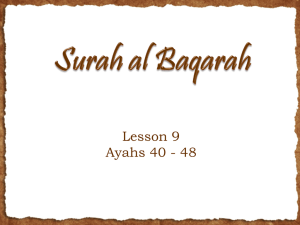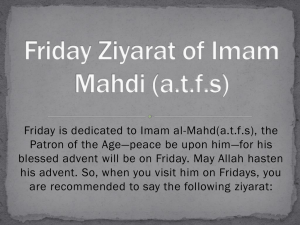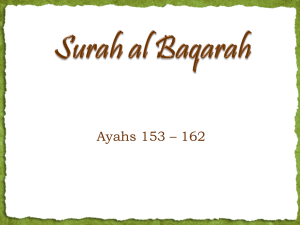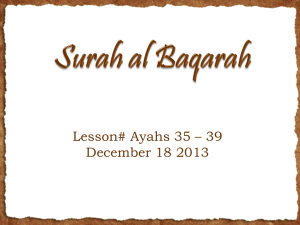Baqarah142-152_Lesson20_Presentation
advertisement
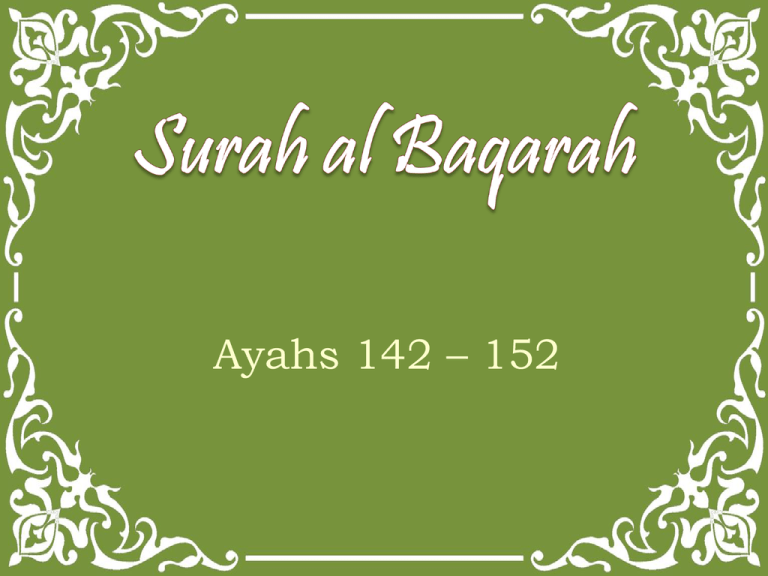
Ayahs 142 – 152 Ayah 142 The foolish among the people will say, "What has turned them away from their qiblah, which they used to face?" Say, "To Allah belongs the east and the west. He guides whom He wills to a straight path." Context • In Makkah, the Prophet SAW faced the Kaabah and Baitul Maqdas (Masjid al Aqsa) in Jerusalem • But in Madinah when they faced Jerusalem, then their backs were towards the Kaabah. The Prophet SAW knew that he would be told to face the Kaabah eventually The Foolish Ones • • • • Includes: 1. The munafiqeen 2. The yahud 3. The mushrikeen Roots • Seen – (it has 3 functions) • 1. it specifies the meaning of the word as future or near future • 2. certainty of the event, that this is definitely going to happen • 3. its an advance warning • Sayaqoolu – the foolishness is being expressed through their words; these people are objecting because of their foolishness Roots • Qaaf baal laam – what you face is in front of you the reason for their foolishness is lack of intellect not lack of knowledge; Allah SWT is telling the Prophet SAW to ignore the foolish people’s objections • Saawd Raaw Taaw – an open and easy path to follow QIBLAH CHANGE One who Objects on Decree of Allah Foolish One who Objects on Commands of Allah Lessons • Allah owns everything, so its not all about just facing one direction or another (we have to face the Kaabah but don’t get caught up in the degrees or angles) • Allah knows what the people were going to say (Past, Present and Future) • Ignore foolish people and their comments Ayah 143 And thus we have made you a just community that you will be witnesses over the people and the Messenger will be a witness over you. And We did not make the qiblah which you used to face except that We might make evident who would follow the Messenger from who would turn back on his heels. And indeed, it is difficult except for those whom Allah has guided. And never would Allah have caused you to lose your faith. Indeed Allah is, to the people, Kind and Merciful. Context • Just as the Kaabah is a means of guidance, the Ummah is a means of guiding others • With the changing of the Qiblah, leadership was being given to the Muslims • But with Privilege comes Responsibility ُأ َّمةً َو َسط Moderate One Middle Link Moderate Nation – How? • 1. An ummah that is mid-most in its time of existence • 2. When it comes to the laws, the commands of this ummah are the most moderate (neither exceed the bounds in worldly matters nor abandon the deen) • 3. Best ummah compared to others; Bani Israel killed prophets while Nasaara worshipped the Prophets • 4. Sunnah passed on to the Ummah and now we have to pass it on and convey the message You witness over the truth Muslim Ummah will witness that Previous messengers conveyed the message to their nations. ول عَلَ ْي ًُْك َشهِيدا ًُ ون َّالر ُس ًَ َويَ ُك Muhammad (s.a.w) Against Our Actions Conveyed the Message Why the Change in Qiblah? • Li’naa’lama – 1. so that we can show the people; so that they know; 2. so that we distinguish between sincere and insincere and 3. so that we can establish recompense • It was a test for the believers to see if they would follow the Prophet SAW Roots • Taa Baa Aain – follow in tangible and intangible ways; sayings and actions • Why is the Name of the Prophet SAW NOT Mentioned? • A) He was the final messenger • B) He is indeed a messenger; his title is only mentioned • C) Encourages us to follow him Roots • Aain Qaaf Baa –when you turn your heels; you completely turn away • The one who refuses to follow the messenger; this was a test to expose the sincerity of the people • The Muslim ummah were tested through change in Qiblah; before this, they were told to face Jerusalem in Madinah, which was difficult for some Roots • Kaaf Baa Raaw – difficult and troublesome • Haa Daal Yaa – guidance; when you accept something, it becomes easy Commands of Allah are not hard for the Ones Guided! Guidance Check!! • Roots • Daawd yaa aain – Allah will not waste your iman by not rewarding you for your previous prayers, even though they were in a different direction • because that command was also from Allah SWT (Muslims prayed in that direction for 1617 months and some died during this) • Imaan’nakum – prayers that the Muslims prayed while facing Jerusalem Roots • Raaw hamza faa – kindness/intense mercy; to be kind to someone and to remove some affliction LESSONS • The commands that Allah gives are difficult for some; when you are guided and have ilm, then they become easy • Following the right path becomes easy; the difference is in the imaan • We have to recognize our role as the Muslim Ummah Test for the Believers Leadership Shift made Obvious Honor for the Believers O our Lord! Let not our hearts deviate (from the truth) after You have Guided us, and Grant us mercy from You. Truly, You are the One who bestow. REFLECTIONS? ANNOUNCEMENTS Ayah 144 We have certainly seen the turning of your face, [O Muhammad], toward the heaven, and We will surely turn you to a qiblah with which you will be pleased. So turn your face toward al-Masjid al-Haram. And wherever you [believers] are, turn your faces toward it [in prayer]. Indeed, those who have been given the Scripture well know that it is the truth from their Lord. And Allah is not unaware of what they do. Ayah 144 - Roots • Hamza Raaw Yaa – present; when Qad comes before it, it gives the meaning of repitition • The Prophet SAW would repeatedly look towards the sky: he longed to face the Kaabah; looked up in the hope for the command • Each time he looked up, Allah SWT saw him • shows that the Prophet SAW didn’t make up anything in the deen; always waited for the command Command to Follow Qiblah! Points about Facing Qiblah • In a plane, you can face any direction the plane is in • For fardh salah, you MUST face qiblah; its part of establishing salah • For nafl salah, its not mandatory (i.e. on a vehicle) • During salah, if you’re praying in the wrong direction, and someone corrects you, then you can turn during salah Qibla Locator [http://www.qiblalocator.com] Ayah 145 And if you brought to those who were given the Scripture every sign, they would not follow your qiblah. Nor will you be a follower of their qiblah. Nor would they be followers of one another's qiblah. So if you were to follow their desires after what has come to you of knowledge, indeed, you would then be among the wrongdoers. Ayah 145 - Roots • Haa Waaw Yaa – their desires of you following their religion and leaving your own religion • You will be abandoning knowledge if you compromise the deen just to please people • Many times, knowledge means going against ones desires or sacrificing them Abandoning Allah’s Commands To Please People To Get their Approval Zulm Ayah 146 Those to whom We gave the Scripture know him as they know their own sons. But indeed, a party of them conceal the truth while they know [it]. Ayah 146 - Roots • Aain Raaw Faa – to recognize something by its signs, knowledge and realization; knowing why and how something should be done • The people of the Book recognized the Prophet SAW really well and were aware of the signs of the last messenger • Ibn – includes daughters too • Leaders would deliberately hide the truth Ayah 147 The truth is from your Lord, so never be among the doubters. Ayah 147 - Roots • Meem Raaw Yaa – one who has doubt; doubt about a fact; is this really from Allah? • Vs. Raaib (doubt that makes you restless) • Mumtareen – don’t doubt about the facts of Allah; when the commands come, don’t be of those who doubt and put other people in to doubt as well WELCOME BACK! • Class Objectives – To learn the word for word translation of the Qu’ran with basic root words – To understand a brief exegesis/tafseer of the Qu’ran – To reflect on the ayahs of the Qu’ran and extract lessons – To be able to practically implement lessons into our everyday lives Reward of Learning & Teaching – Duas for learning knowledge – Hadith about the reward of learning knowledge; going in the path of Allah for the sake of knowledge – Intention: Importance of intention and renewing our intentions for every class – Every action is based upon intention CLASS ETIQUETTES • Class etiquettes – Talking – Asking relevant questions, disclaimer that not all questions would be answered by teacher, but research can be done to look up the answers – NO FIQH QUESTIONS/PERSONAL QUESTIONS – Eating/drinking – Laptop use, phone use – Juz 2 Books RESOURCES • www.journeytothequran.com • www.alhudacanada.com Root words Form the main part of a word, provide the basic meaning of the word Joined along with some other letters to form different words which have related meanings Arabic words have three letter roots and rarely four or five letter roots Always maintain their order / specific arrangement. Why know the Roots ? To know the translation of the word To analyze the word To use the Arabic dictionary one must know the root of the word TO Pass the tests Eat eating eats eaten eatable branching words Masdar Root Topic : 2 Huroof Illat (Missing/Chilling Letters) Huroof Illat • • • Alif Waaw Yaa Huroof Illat You can call them sick letters - weak letters They get tired easily So when they appear in Roots , they may Be Present Or Absent Or send another weak letter in their place قَالHe said Changed قول dropped speech قلSay ! Present ل َ يقَوHe says Can there be more than one defective letters in one Root? Yes there can be ۡ َّ َلِّلمت ِقين و ق ي Example : Surah Al Baqarah : 2 Meat of the matter is • Normal Root words You just need to recognize them • Root words with defective letters You have to learn them The Double Lettered Root word…. • In Some Root words the Second and Third Radical are identical • In Such cases the second radical will have shaddah • Example : The word ِّّ َربis from root ب رب In other words… • Shaddah means “The Letter is twice” Other Examples…. ضالّينَّ • َي ُم ُّدهُمّ • صمّ • ُ َربهّ • Ayah 148 For each [religious following] is a direction toward which it faces. So race to [all that is] good. Wherever you may be, Allah will bring you forth [for judgement] all together. Indeed, Allah is over all things competent. Ayah 148 - Roots • Waaw Jeem Haa – a direction one faces (tangible) and a goal/purpose (intangible) • Seen Baa Qaaf – to try to get ahead of other people; to run towards a particular goal/competing • Khaaw Yaa Raaw – race towards something that is good; beneficial for yourself, for others and also pleases Allah SWT Everyone has some goal What are our goals? What are my goals? What is my center of life? What is my top most priority? What is that thing to which I keep on returning to? Ayah 149 So from wherever you go out [for prayer, O Muhammad] turn your face toward alMasjid al-Haram, and indeed, it is the truth from your Lord. And Allah is not unaware of what you do. Ayah 150 And from wherever you go out [for prayer], turn your face toward al-Masjid al-Haram. And wherever you [believers] may be, turn your faces toward it in order that the people will not have any argument against you, except for those of them who commit wrong; so fear them not but fear Me. And [it is] so I may complete My favor upon you and that you may be guided. Wisdom behind the emphasis People won’t have hujjah Completion of the Deen For Guidance Why 3 Repetitions? • 1. to contradict the previous Qiblah • 2. the command is for all places and all times • 3. there should not be any deviation from the Qiblah Ayah 150 - Roots • The people who do Dhulm will continue to argue against you but do not fear them… • Khaaw Sheen Yaa – fear out of knowledge; realization of someone’s greatness • Taa Meem Meem - The Kaabah was chosen so that the deen may be completed for us, as a favour • Therefore, fear Allah and not the people Ayah 151 Just as We have sent among you a messenger from yourselves reciting to you Our verses and purifying you and teaching you the Book and wisdom and teaching you that which you did not know. Ayah 151 - Context • Just as we sent amongst you a messenger, the Kaabah was also a blessing • 1. Tilawah is mentioned first; having correction recitation & pronunciation • 2. Tazkiyah: a) removing shirk from their lives b) practically showing the knowledge • 3. Hikmah – how to act upon a command; sunnah • 4. Teaches us whatever else we didn’t know REFLECTION • No one was born with the knowledge of the deen, so we have to learn it Ayah 152 So remember Me; I will remember you. And be grateful to Me and do not deny Me. Remember Allah by Obeying Allah He will Remember you by Forgiving You Ayah 152 - Roots • Dhaal Kaaf Raaw – remember Allah for all the blessings; remember by obeying Allah and He will remember you by forgiving you • Sheen Kaaf Raaw – be thankful for the Qiblah; in contrast to kufr by disobeying in this matter or hiding favours of Allah SWT REFLECTIONS Ayahs 153 – 162 Ayah 153 O you who have believed, seek help through patience and prayer. Indeed, Allah is with the patient. Roots • Aain Waaw Noon – General help • Saawd Baa Raaw – to control oneself; 3 types: • 1. At the time of difficulty, holding yourself back from negativity (i.e. why me; I wish I could die) • 2. to hold oneself firm on the obedience of Allah SWT • 3. when a person holds oneself back from doing what Allah dislikes SABR At the Time of Calamity Hold Oneself on the Obedience of Allah Hold Oneself back from Disobedience of Allah َم ِعًَّية Generic Specific Allah is with people with His knowledge Allah is with believers with His Help & Support O Allah! Make me one who is most patient and grateful; and make me small in my own eyes but great in the eyes of others. When the world pushes you to your knees, your are in the perfect position to pray. Unknown The shortest distance between a problem and its solution is the distance between your knees and the floor. The one who kneels to Allah can stand up to anything. Unknown Psychology Connection • DELAYED GRATIFICATION – ability to resist the temptation for an earlier reward and wait for a reward later on (SelfControl) • In our brain, we have the reward circuitry and when we control ourselves from acting on our emotions, this benefits our behaviour in life LESSONS • SABR does NOT mean being passive • Be active, get help, keep doing what you’re doing and ALSO ask for Allah’s help without complaining or haste • Patience is a sign of a person’s imaan • Don’t object to the decree of Allah



